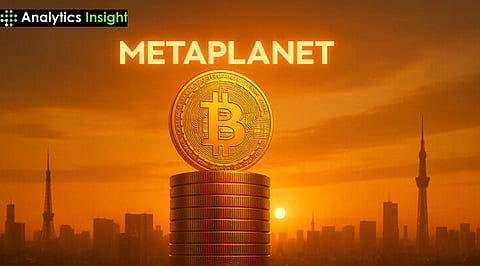

Adds 136 BTC, taking holdings to 20,136 BTC worth $2.08 billion, ranking sixth among public holders.
Nasdaq backs Gemini IPO, while Bitget Wallet partners with Aave to launch a 10% APY stablecoin product.
Worldcoin rallies 50% on treasury adoption, as Sky enters the USDH stablecoin bidding war with $25 million in funding.
The cryptocurrency market remains abuzz with institutional moves, bold treasury strategies, and fresh product launches. From Metaplanet’s record Bitcoin purchases to Nasdaq’s strategic stake in Gemini, the week has seen multiple developments highlighting both investor confidence and intensifying competition in the digital asset ecosystem.
Japanese Bitcoin treasury firm Metaplanet doubled down on its aggressive accumulation strategy despite Bitcoin’s recent volatility. After briefly touching an all-time high near $125,000, Bitcoin slipped below $115,000, and Metaplanet seized the opportunity to add another 136 BTC worth approximately $15.2 million.
The purchase, disclosed by CEO Simon Gerovich on X, raised the company’s reserves to 20,136 BTC, valued at roughly $2.08 billion. This vaults Metaplanet into 6th place among public companies holding Bitcoin, behind only names like MicroStrategy and Marathon Digital.
With an average acquisition cost of $103,196 per coin, Metaplanet has surpassed its earlier 2025 goal of 10,000 BTC and is fast approaching its 2026 target of 21,000 BTC.
The move underscores the firm’s conviction in Bitcoin as a strategic reserve asset, echoing state-level adoption models seen in El Salvador.
Also Read: Bitcoin Price at $112,000 as MicroStrategy Buys More, is the Next Stop $120,000?
Reuters reported that Nasdaq will participate in the initial public offering (IPO) of Gemini, a crypto exchange founded by Cameron and Tyler Winklevoss.
Nasdaq is set to acquire $50 million worth of Gemini shares via a private placement at the IPO. The deal is expected to enhance synergies between the two firms, as Nasdaq’s clients will gain access to Gemini’s custody and staking services.
Gemini aims to raise over $300 million through the sale of up to 16.6 million Class A shares, priced between $17 and $19 each, and will trade under the ticker GEMI. If successful, it will become the third publicly listed US exchange, joining Coinbase and Bullish.
However, Gemini’s IPO comes amid weaker financials, with losses of $282.5 million in the first half of 2025 compared to $41.4 million a year earlier.
Despite this, Nasdaq’s backing offers a crucial vote of confidence as the exchange seeks to expand its institutional footprint.
Bitget Wallet, a global cryptocurrency wallet provider, has partnered with decentralized lending protocol Aave to launch Stablecoin Earn Plus, a USDC-based yield product offering 10% annual returns.
The initiative integrates Aave’s lending pools with Bitget’s subsidies, guaranteeing a minimum APY of 10% on deposits up to $10,000, while providing instant withdrawals. To celebrate the launch, an introductory APY of 18% will be available until September 15.
The product aims to bring institutional-grade yields to retail savers, highlighting the ongoing trend of democratizing DeFi.
Bitget Wallet emphasized security by leveraging its $700 million User Protection Fund, while Aave founder Stani Kulechov noted the importance of making decentralized yields more accessible globally.
Worldcoin (WLD), the cryptocurrency project co-founded by Sam Altman of OpenAI, soared more than 50% in 24 hours, hitting an eight-month high of $2.03. The surge followed news that US-based Eightco Holdings will add WLD to its crypto treasury model.
Eightco raised $250 million in private funding and secured an additional $20 million from BitMine Immersion to support acquisitions. The firm’s strategy mirrors that of MicroStrategy, positioning Worldcoin alongside Bitcoin and Ethereum in corporate treasuries.
Despite ongoing privacy controversies around its iris-scanning identity system, Worldcoin’s inclusion in treasury reserves highlights a new wave of adoption beyond speculative trading.
Also Read: Why is Bitcoin Stuck Near $110K Despite Fed Rate Cut Hopes?
Competition to issue Hyperliquid’s USDH stablecoin intensified as Sky Protocol became the 5th major bidder. Sky proposed a 4.85% yield on USDH holdings and pledged $25 million in ecosystem development funding, positioning itself as a serious challenger to frontrunner Stripe’s Bridge proposal.
Sky’s offer leverages its proven track record with DAI and USDS, managing more than $8 billion in collateral. The plan promises access to $2.2 billion in instant USDC liquidity, multichain deployment via LayerZero, and integration with platforms like spark.fi and defisaver.com.
The bidding war has drawn in heavyweights such as MoonPay, Agora, and Paxos, reflecting the growing stakes around Hyperliquid, which recently reported $383 billion in monthly trading volume and controls 70% of the DeFi perpetuals market share.
1. How much Bitcoin does Metaplanet hold now?
Metaplanet holds 20,136 BTC worth about $2.08 billion, with an average buy price of $103,196.
2. Why is Nasdaq investing in Gemini?
Nasdaq plans a $50 million stake to expand custody, staking, and collateral management synergies with Gemini.
3. What is Bitget Wallet’s new product with Aave?
It’s a stablecoin yield product, Stablecoin Earn Plus, offering 10% APY on USDC deposits with instant withdrawals.
4. Why did Worldcoin’s price surge?
Worldcoin jumped 50% after Eightco Holdings announced it would add WLD to its crypto treasury model.
5. What role is Sky playing in the USDH stablecoin race?
Sky Protocol pledged $25 million ecosystem funding and a 4.85% yield, competing against Stripe’s Bridge and other bidders.
Join our WhatsApp Channel to get the latest news, exclusives and videos on WhatsApp
_____________
Disclaimer: Analytics Insight does not provide financial advice or guidance on cryptocurrencies and stocks. Also note that the cryptocurrencies mentioned/listed on the website could potentially be risky, i.e. designed to induce you to invest financial resources that may be lost forever and not be recoverable once investments are made. This article is provided for informational purposes and does not constitute investment advice. You are responsible for conducting your own research (DYOR) before making any investments. Read more about the financial risks involved here.
